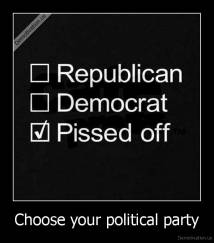I envy people who know with certainty who to vote for. One could vote on instinct, or plump for whoever looks least incompetent. One can even (somehow) overlook the fact that many our politicians are hypocrites, criminals and PPE graduates. But that’s not all you’d have to ignore.
“However [political parties] may now and then answer popular ends, they are likely in the course of time and things, to become potent engines, by which cunning, ambitious, and unprincipled men will be enabled to subvert the power of the people and to usurp for themselves the reins of government, destroying afterwards the very engines which have lifted them to unjust dominion.”
~ from George Washington’s farewell address
The UK’s first political parties emerged in the aftermath of nearly half a century of Civil Wars plus one Glorious Revolution, which is what it took to get past the idea of a monarch who could do whatever they wanted because god was okay with it. The Whigs were the aristocrats who supported rule by the parliament; the Tories were traditional gentry who stuck to “God, King and Country”.
For the most part, this two-party system has dominated British politics ever since. The Whigs were succeeded by the Liberals and then the Labour party (originating as a party for the working classes), which extended rights and protection to more of the population, increasing the power of the middle classes. The Tories were succeeded by the Conservatives, who (and this is something of an over-generalisation) were more interested in the ‘big picture’; they wanted to make the nation strong by favouring rich people who might be able to maintain or improve the country’s standing, whether they gained their affluence by inheritance, or by trade and industry.
The USA has a two-party system as well, although it arose from different opinions on how to react to the French Revolution; the succeeding Democrat and Republican parties have been split in different ways by the aftermath of the Civil War and dealing with civil rights. Like the UK two-party system, it’s also been disrupted by political opportunism, but that’s a topic that will have to be dealt with in another blog post.
Of course, there are more than just two parties for voters to choose from. Some represent specific regions or philosophies, but in modern politics I reckon you can roughly divide parties into two groups grappling with different answers to the same problem.
One group will follow the line, “Give a man a fish and he’ll eat for a day.” This group will be concerned with making sure that citizens are given what they need to live comfortably and attain their goals, which is a good way to become popular and win elections. Unfortunately, there’s a tendency to overlook where the fish will come from or who’s going to pay for them, and this group of parties will, somehow, bugger up their nation’s economy.
The other group follows the line, “Teach a man to fish and he’ll eat for a lifetime.” Ostensibly, this group champions individual liberty, giving people the right to do what they want with their life without state interference and without the state taking away their hard-earned rewards. This, too, sounds appealing and is, from time to time, a vote-winner. What this group tends to overlook is who’ll do the ‘teaching’, and whether or not everyone will be capable of fishing. In practice, the only people who really benefit are those who already have the means to look after themselves; it is assumed that anyone unable to look after themselves must have some sort of moral failing – that they are too lazy or stupid to do so. The economy may well prosper for a short time under this group (assuming money isn’t wasted on warfare or stock market gambling), but at the cost of depriving citizens of essential aid (or work).
Of course, this supposes that parties will represent people who hold particular views. To a certain extent, this is still true. However, the electorate is too complex for the simple, binary view I’ve just described (more details here for the UK). But that’s not the biggest problem – instead, it’s the fact that membership of political parties is declining. This is more pronounced in the UK than it is in most of Europe, and is affecting the USA as well.
So to stick with the British example, if membership of political parties is so low, who -or what- exactly do our MPs represent? If candidates for elections are selected by a few ‘party members’, they won’t represent a local community or a strata of society or a portion of the electorate, but “the party” (or rather, a tiny cabal of people who think they represent “the party”). In some places, this can result in candidates with extreme views representing a larger, national party, skewing its policies. When elected, instead of following the views of their voters, MPs are encouraged to follow the ‘party line’.
Does ‘The Party’ care more about the people who voted it into power, or about the idea of being in power for itself? Who benefits?
Of course, all of this assumes that the people we vote for will end up representing us.
(To be continued…)


Pingback: My problems with politics, part 6: promises, promises… | Observaterry·
Pingback: My problems with politics, part 7: policies and stupidity | Observaterry·
Pingback: Lying Cu*ts | Observaterry·